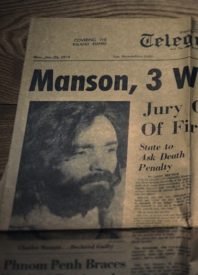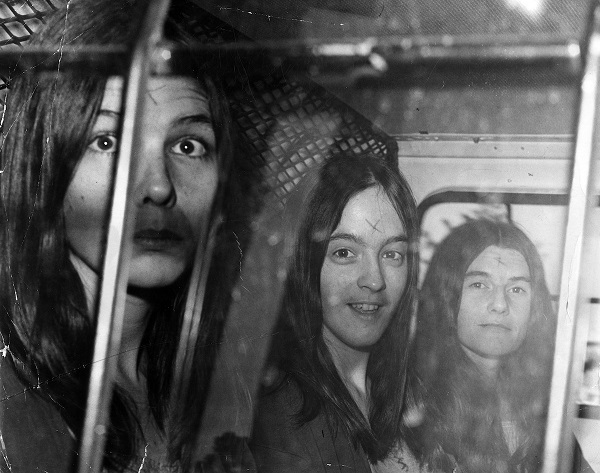
As much as it pains me to say it, there are few characters in recent history that continue to fascinate our culture more than Charle Manson.
In the new docuseries Helter Skelter: An American Myth, director Leslie Chilcott takes a deep dive into the events that shook the nation. On January 25th, 1971, Manson and three women in his ‘family’ were convicted of the brutal murders of nine people, including actress Sharon Tate, Jay Sebring and more. Now, fifty years later, Chilkott revisits the story of the mysterious man and his followers in an attempt to understand why this story continues to build intrigue and weave its way into our cultural fears.
It’s been five decades. And the Manson family and its string of murders have taken on (as the title suggests) an almost mythic status. Charles Manson died in 2017. His charisma and charm gave his dark and twisted beliefs an enigmatic quality that made him a monster people wanted to see. At the same time, the shocking murders of Tate, Sebring and others left a mark on the American psyche. That mark persists to this day. (Tarantino wrote the Oscar winning film, Once Upon a Time in Hollywood about it. It was his attempt to revise these tragic events with a new ‘fairytale’ ending.)
Helter Skelter features revealing new interviews and perspectives. It takes its time to be thorough in its quest to understand the Tate murders and the Manson family. Through its it exploration of Manson’s childhood and family, the series does an excellent job of building a contextual story about the man. It allows for the viewer to gain insight into his complicated mind of madness. In this way, the series moves away from asking ‘how this could happen’. And it leans into the broader (and arguably more important) question of ‘who made this happen?’
Helter Skelter explores the abuse he suffered from his teachers, family and their church. It fleshes out Manson’s story from his early childhood with more depth than we’ve seen before. Skelter doesn’t just simply portray him as an enigmatic manipulator. It instead recognizes the realities of abuse that a young man faced from his early years and how that could warp his perceptions. It’s worth noting that Chilcott does not seem to use these moments to build sympathy for a mysterious mastermind. But instead she uses those moments to humanize him. Manson found himself embroiled in a culture of toxic masculinity. It sees Manson as a young man who was under constant attack for his inability to be ‘manly’. (In fact, in one harrowing tale, Mason’s grandfather even sent him to school. He made Manson wear a dress because he wasn’t ‘man enough’… at the age of 6).
Though, even with all these new perspectives on his life, the culture of abuse that he created still seems… unbelievable. He preyed on young women who he believed ‘couldn’t survive without him’. He had this ability to manipulate others by spewing Biblical-esque tropes of love, revolution and Revelation continues to boggle the mind. Skelter highlights Manson’s years of deliberate study of how to influence others. It thus points to a man who intentionally created a world with himself at the centre and convinced innocent youth to follow. He’s been dead for decades. But his charismatic nature is also what kept him in the limelight of a culture that both judged yet remained mystified by him.
Many believe that the Manson murders are the ‘crime of the century’. They have all the intrigue, sexuality and unanswered questions that keeps people fascinated. Helter Skelter even notes that Manson understood this aspect of culture. He continued to manipulate the media for his benefit long after the events took place. The show considers this. And the final episode attempts to remind the viewer that we empower these villains with our fascination of them. Somewhat ironically, however, these conversations are a mere 10 minutes of runtime. It amounts to a mere footnote at the end of a 6-hour deep dive into the mind of the madman. Skelter’s warning for over-emphasizing our demons is a valid point. But the series’ decisions regarding its runtime actually works against their own argument and feels slightly ‘tacked on’.
Despite its solid interviews and context, Helter Skelter still feels like it offers more questions than answers. Perhaps it’s the shocking brutality of the crimes or the undying dedication of the ‘family’ for their leader. But Skelter still seems unaware of how events like these could ever come to fruition. However, it’s possible that those observations are exactly the point. In Helter Skelter, Chilcott refuses to offer platitudes or over-simplify the reasons behind Manson’s actions.
Instead, she only points out the fact that we still remain fascinated by them.


